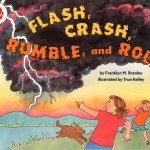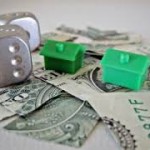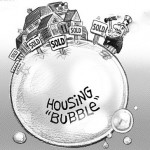
Readers & Thinkers: The 2008 Nobel Prize in Economics. Not Enough Variety
Posted by ludw1086 on Sep 7, 2012 in Readers & Thinkers | Comments Off on Readers & Thinkers: The 2008 Nobel Prize in Economics. Not Enough VarietyDear All:
Well, who won?
The Nobel prize for economic sciences for 2008 was announced today, October 13, 2008. It went to
Paul Krugman for his work in international trade theory and economic geography.
Paul Krugman was one of my Ph.D. advisors at MIT. I even published a paper in the theory of economic geography, a field for which he won the prize.
Krugman is 55 years old. He obtained his BA from Yale University and his Ph.D. from MIT. He is currently a professor at Princeton University. He won the prestigious Clarke Medal in 1991, which is awarded to the best young economist under 40 years of age. He has also published many text books and popular books. One of the best books for teaching undergraduate international economics is the textbook he wrote with Obstfeld.
The prize for international economics was due, but I did not think they would give it to Paul Krugman alone. I really am not sure if it was right to give it to him alone, given a small list of other talented international economists. What about Bhagwati? Dixit? Did they just kiss their Nobels goodbye?
Lots of economists used to say that Krugman wouldn’t win it because of all his popular writing, like the NY Times regular essay. Well, I guess they were wrong. Maybe all that writing was beneficial, since it completely bashed the Bush administration and advocated a more socialist style system (which Swedes really like).
So what did he do that makes him Nobel?
Krugman was awarded the Nobel
“for his analysis of trade patterns and location of economic activity”.
International Trade: Prior to Krugman’s work, the main idea explaining trade between countries was the idea of specialization and comparative advantage. That is, country A and country B traded with each other because total production could be higher if A and B specialized in what they were relatively better at producing and then traded for the other goods. For example, if country A has access to good weather for producing grapes and hence wine and country B has a cold climate, but whose land can be used for raising sheep. Then country A should make wine and country B should make wool and they should trade. It’s easy to show that this makes both countries better off than if they didn’t trade. This theory of trade is known as comparative advantage. It’s still a very important part of why people trade today as well. Sometimes country A and country B have different types of skilled workers, thus the country with less skilled labor exports manufactured goods, while the more skilled country might export IPOs or iPods. This work was advanced by Heckscher-Ohlin which stated that countries would export goods that utilize their relatively cheaper factors of production.
However, this theory doesn’t seem to explain all trade. A lot of trade occurs between similarily industrialized countries in similar goods. That is, Europe makes cars and the
US makes cars. Sure, there might be subtle differences among the cars, but it’s basically the same type of good. Yet, we trade in cars. We also can buy wines in the wine store produced in a variety of countries. Wine from Italy (of course!), France, Chile, Australia, USA, etc. So there is lots of trade of similar goods by similar countries.
This led Krugman (along with Dixit, Norman, Ethier) to build a new trade model. Krugman’s first paper was extremely simple. He simply added two ideas. One was that goods were produced with economies of scale. The second was that consumers prefer variety. Krugman borrowed a new tool developed by Dixit and Stiglitz which showed how to model these sort of consumer preferences. With these two relatively straightforward assumptions, he was able to show that trade will occur even if country A and B have identical consumers, identical technology, and identical endowments of inputs to production. Trade occurs because there are more people/firms to produce more types of goods, given economies of scale and a love for variety, this makes people better off. You get more goods than in a world without trade and that makes people happier.
Economic Geography: There is a long line of research in this field which asks why does the landscape of economic activity look like it does? Why do cities form? Why do Edge Cities form? Why does economic activity seem to concentrate in one area. In some sense, most people understood the answers to these questions. Krugman began to develop simple models of firm structure to explain how economies of scale in production would cause firms to locate near each other. Most of models relied on simulations rather than closed form solutions. In fact, my contribution to this field was to provide a closed-form solution in realistic geometry to the basic core-periphery model
Unfortunately, I must admit, this work by Krugman and others did not go very far. I think most of the models of economic geography really have not been particularly useful at explaining the patterns of cities and economic activity across the landscape. One of the beauties of simplistic models is that they are easy to understand and can explain difficult concepts with a few parameters. On the other hand, one of the problems with simplistic models is that they miss too much of reality. I think a bit of both applies to all of Krugman’s work, but in economic geography, more than trade, the models miss too much reality.
So great, but didn’t he do all this work 30 years ago? What has been doing since?
Krugman still publishes textbooks, writes a column for the NY Times, and writes popular books. He hasn’t really done much scholarly work for many years. He mainly bashes the Bush administration at regular intervals through his various writings.
In fact, a few years ago at the reception of Rudiger Dornbusch’s memorial, I was talking to Krugman at the buffet table. Scurring across the room was 84 year old Franco Modigliani (also a Nobel prize winner). He grabbed Paul’s coat sleeve and said in an Italian accent:
“Paul, they are trying to privatize social security. You need to write and make them stop. We can’t waste all these years of economic theory.”
It was an important point. Sometimes policy makers forget economic theory or even worse they aren’t aware of it. It was also Franco’s way of saying to Paul to stop writing nonsense and start working on important policy issues.
Anything else about this Nobel?
Krugman was expected to win the Nobel prize some day, so this isn’t a surprise. I would have liked to see other names share the prize with him. Perhaps Bhagwati, perhaps Dixit, and maybe some others. I also regret that Rudiger Dornbusch, one of Krugman’s teachers, isn’t alive to collect the prize too. Dornbusch was one of the most interesting and fascinating men I ever met. Almost every great scholar of international economics was one of his students.
So is that it?
It should always be remembered that advancement in economic science doesn’t come from just one or two individuals. It comes from a body of scholars and practitioners. I think economists should remember that if we’re not focused on giving some time to real-world matters, we are not doing our job. Keynes was always actively involved in issues that affected everyone. We are currently in a financial crisis and all scholars should try to help and continue helping to avert future crises.
For more information on the winner:
http://nobelprize.org/nobel_prizes/economics/laureates/2008/press.html
Finally, congratulations to Paul Krugman for his award.
Enjoy!
Ludwig






